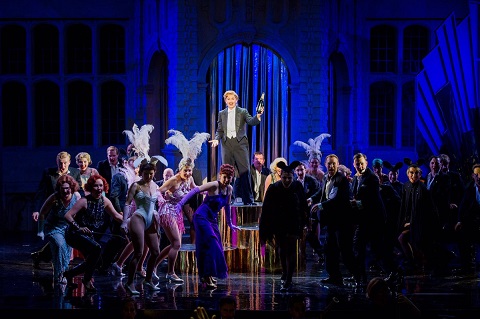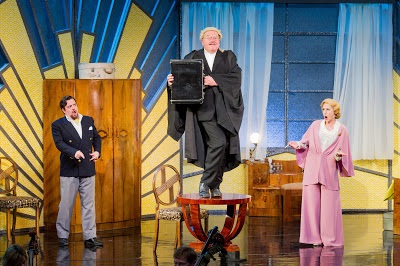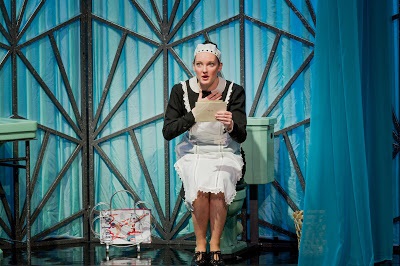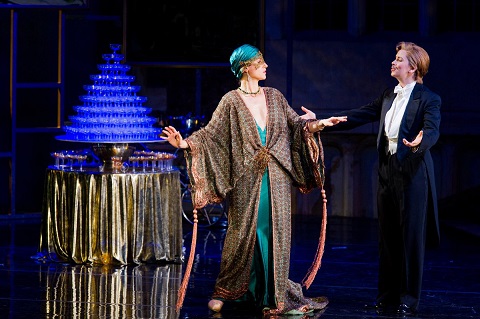
20 Jul 2016
Die Fledermaus, Opera Holland Park
With the thermometers reaching boiling point, there’s no doubt that summer has finally arrived in London. But, the sun seems to have been shining over the large marquee in Holland Park all summer.
English Touring Opera are delighted to announce a season of lyric monodramas to tour nationally from October to December. The season features music for solo singer and piano by Argento, Britten, Tippett and Shostakovich with a bold and inventive approach to making opera during social distancing.
This tenth of ten Live from London concerts was in fact a recorded live performance from California. It was no less enjoyable for that, and it was also uplifting to learn that this wasn’t in fact the ‘last’ LfL event that we will be able to enjoy, courtesy of VOCES8 and their fellow vocal ensembles (more below …).
Ever since Wigmore Hall announced their superb series of autumn concerts, all streamed live and available free of charge, I’d been looking forward to this song recital by Ian Bostridge and Imogen Cooper.
The Sixteen continues its exploration of Henry Purcell’s Welcome Songs for Charles II. As with Robert King’s pioneering Purcell series begun over thirty years ago for Hyperion, Harry Christophers is recording two Welcome Songs per disc.
Although Stile Antico’s programme article for their Live from London recital introduced their selection from the many treasures of the English Renaissance in the context of the theological debates and upheavals of the Tudor and Elizabethan years, their performance was more evocative of private chamber music than of public liturgy.
In February this year, Albanian soprano Ermonela Jaho made a highly lauded debut recital at Wigmore Hall - a concert which both celebrated Opera Rara’s 50th anniversary and honoured the career of the Italian soprano Rosina Storchio (1872-1945), the star of verismo who created the title roles in Leoncavallo’s La bohème and Zazà, Mascagni’s Lodoletta and Puccini’s Madama Butterfly.
Evidently, face masks don’t stifle appreciative “Bravo!”s. And, reducing audience numbers doesn’t lower the volume of such acclamations. For, the audience at Wigmore Hall gave soprano Elizabeth Llewellyn and pianist Simon Lepper a greatly deserved warm reception and hearty response following this lunchtime recital of late-Romantic song.
Collapsology. Or, perhaps we should use the French word ‘Collapsologie’ because this is a transdisciplinary idea pretty much advocated by a series of French theorists - and apparently, mostly French theorists. It in essence focuses on the imminent collapse of modern society and all its layers - a series of escalating crises on a global scale: environmental, economic, geopolitical, governmental; the list is extensive.
For this week’s Live from London vocal recital we moved from the home of VOCES8, St Anne and St Agnes in the City of London, to Kings Place, where The Sixteen - who have been associate artists at the venue for some time - presented a programme of music and words bound together by the theme of ‘reflection’.
'Such is your divine Disposation that both you excellently understand, and royally entertaine the Exercise of Musicke.’
Amongst an avalanche of new Mahler recordings appearing at the moment (Das Lied von der Erde seems to be the most favoured, with three) this 1991 Mahler Second from the 2nd Kassel MahlerFest is one of the more interesting releases.
‘And there was war in heaven: Michael and his angels fought against the dragon; and the dragon fought and his angels, And prevailed not; neither was their place found any more in heaven … that old serpent … Satan, which deceiveth the whole world: he was cast out into the earth, and his angels were cast out with him.’
If there is one myth, it seems believed by some people today, that probably needs shattering it is that post-war recordings or performances of Wagner operas were always of exceptional quality. This 1949 Hamburg Tristan und Isolde is one of those recordings - though quite who is to blame for its many problems takes quite some unearthing.
There was never any doubt that the fifth of the twelve Met Stars Live in Concert broadcasts was going to be a palpably intense and vivid event, as well as a musically stunning and theatrically enervating experience.
‘Love’ was the theme for this Live from London performance by Apollo5. Given the complexity and diversity of that human emotion, and Apollo5’s reputation for versatility and diverse repertoire, ranging from Renaissance choral music to jazz, from contemporary classical works to popular song, it was no surprise that their programme spanned 500 years and several musical styles.
The Academy of St Martin in the Fields have titled their autumn series of eight concerts - which are taking place at 5pm and 7.30pm on two Saturdays each month at their home venue in Trafalgar Square, and being filmed for streaming the following Thursday - ‘re:connect’.
The London Symphony Orchestra opened their Autumn 2020 season with a homage to Oliver Knussen, who died at the age of 66 in July 2018. The programme traced a national musical lineage through the twentieth century, from Britten to Knussen, on to Mark-Anthony Turnage, and entwining the LSO and Rattle too.
With the Live from London digital vocal festival entering the second half of the series, the festival’s host, VOCES8, returned to their home at St Annes and St Agnes in the City of London to present a sequence of ‘Choral Dances’ - vocal music inspired by dance, embracing diverse genres from the Renaissance madrigal to swing jazz.
Just a few unison string wriggles from the opening of Mozart’s overture to Le nozze di Figaro are enough to make any opera-lover perch on the edge of their seat, in excited anticipation of the drama in music to come, so there could be no other curtain-raiser for this Gala Concert at the Royal Opera House, the latest instalment from ‘their House’ to ‘our houses’.
"Before the ending of the day, creator of all things, we pray that, with your accustomed mercy, you may watch over us."

With the thermometers reaching boiling point, there’s no doubt that summer has finally arrived in London. But, the sun seems to have been shining over the large marquee in Holland Park all summer.
Opera Holland Park have given us three smashing productions so far this season (Iris;La bohème;La Cenerentola) and this new production of Strauss’s champagne-fuelled Die Fledermaus, directed by Martin Lloyd-Evans, fizzes along like a glass of bubbly.
Lloyd-Evans pulls off the trick of balancing tongue-in-cheek farce with dramatic credibility. Rather than the inanities of a Carry-On caper, this show presents a romp with the wit and sparkle of an Ayckbourn farce enjoyed in a seaside theatre in mid-summer.
It’s true that there’s little of the ‘darkness’ which casts a subtle shadow over Strauss’s escapist fantasy. And, for those who remember Christopher Alden’s 2013 ENO production, which buried the fun beneath Freudian symbolism and envisaged the protagonists as psychiatric case-studies, that might be a good thing. But, there’s little sense of Viennese nostalgia either. Strauss may have recreated the debonair congeniality of aristocratic life in fin-de-siècle Vienna, but the world he presents was resting on a precipice: the ‘fall’ to come was swift and deep, and the operetta spares neither working-class ambition nor the apathy, frivolity and superciliousness of the Viennese elite in a time of economic and political uncertainty. Alfred’s seductive plaint to Rosalinde, ‘Happy are those who forget that which cannot be changed’, might be seen as a comment on bourgeois attitudes following the stock-market crash of 1873.
 Act 1: Ben Johnston (Eisenstein), Robert Burt (Dr Blind), Susanna Hurrell (Rosalinde)
Act 1: Ben Johnston (Eisenstein), Robert Burt (Dr Blind), Susanna Hurrell (Rosalinde)
What we have instead is stunningly lit (Howard Hudson) Art Deco decadence. Designer takis replaces the curves of Art Nouveau with the angles of Art Deco, and in Act 1 uses elegant glass and metal screens to partition the stage, thereby creating the Eisensteins’ intimate but uncluttered boudoir and bathroom. With the extant walls of the Elizabethan Holland House visible in the background, the effect was the blend of medieval royal palace and cutting-edge modernity that one finds at Eltham Palace, the colour-schemes of which takis’ palette recalled. The design was economical too. The screens were swivelled to expose the Holland House portico and entrance steps, and a pyramid of champagne coupes, a trio of round gold pedestals, heaps of sumptuous pillows, and a sprinkle of some topless male waiters, bunny-girls and cross-dressing revellers transported us from private chamber to public ballroom. Prince Orlofsky’s palace was an ironic meeting-place of burlesque and Kubrick’s Eyes Wide Shut.
The Opera Holland Park Chorus were once again superb in this Act 2 ball scene, the vocal precision and vitality even more impressive as Adam Scown’s slick, detailed choreography kept them busy. They were naturalistic as party-goers and showman-like as whirling dancers. They were permitted a brief rest during the ballet sequence in which burlesque dancer Didi Derriere (yes, really) tickled their fancies with a beguiling ostrich-feather fan display.
After the carousing highs of Act 2, the final act always struggles to maintain momentum and a distinct hang-over pall descended in Act 3, as the glittering screens and colours faded to leave us in grey prison, sparsely adorned with desk and filing cabinets. Ingeniously, though, we were afforded a glimpse into the cells where the merrymakers slept off the excesses of the night: stage-right, a square-patterned frame which had lurked in the distance all evening, inconspicuously according with the general design, was now brought the fore and populated with inebriate-strewn mattresses.
Lloyd-Evans’ slapstick requires nimbleness and good comic timing from his cast, and they oblige. Prison governor Frank - sporting a Clousseau mac - can’t enter a room without tripping over the doorstep and ends up asleep with his head in a bucket; horse-play with cuff-links and overcoats repeatedly leaves the characters tied in knots. Alfred’s attempt to infiltrate his beloved’s bedchamber via a ladder is thwarted, time and time again, by a slamming of the window: what could have been hackneyed instead became the delightful fulfilment of expectation - was it my imagination, or was there a slightly longer, playfully teasing, delay before each successive crash? The ‘off-kilter choreography’ of the four Keystone Cops who accompany Frank to arrest Eisenstein is charming - as is the bashful smile of the fourth, and somewhat tardy, diminutive copper. Their bobbing and baton routines, their over-swift departure and sheepish return, last just long enough to tickle without irritating. And, it takes a lot of practice to get the sequences that ‘wrong’.
The farce is aided by Alistair Beaton’s rhyme-wielding translation. The verbal gags are engagingly modern but in keeping with the spirit of the original. And who could fail to be impressed by the blustering Dr Blind’s neologistic invention: ‘magnifying’, ‘modifying’, ‘ratifying’, ‘verifying’, ‘speechifying’, ‘simplifying’, classifying’, ‘disqualifying’ […] ‘alibi-ing’! The spoken dialogue came across well, the Eisenstein’s RP contrasting with Falke’s Irish brogue. Adele’s neat switch between Home Counties and northern working-class exemplified her social aspirations and get-up-and-go.
Indeed, as Jennifer France perched in Eisenstein’s bathroom excitedly poring over the invitation from her sister, Ida, to attend the Prince’s ball, it was clear that this was a chambermaid who knew her own mind and was going places. France negotiated the bravura coloratura with ease and the Act 2 ‘Mein Herr Marquis’ was a dramatic and musical delight: unceremoniously spun and dumped into a pile of cushions, Ben Johnson’s Eisenstein was no match for this sassy lass.
 Jennifer France (Adele)
Jennifer France (Adele)
Johnson and Susanna Hurrell were a good comic duo in Act 1 and the Act 2 seduction-duet was fun, as Hurrell taunted her frustrated, belittled husband with his pocket-watch. Johnson has an elegant voice, but it is quite light, though nimble and warm; I’d have liked a bit more authority - after all he is the ‘master’ of the house - but he stamped his presence more forcefully when convincingly disguised as Dr Blind. Hurrell’s Rosalinde was glamorous in a rose-pink pyjama suit and exotic in a fabulous green-and-gold get-up as the Hungarian princess. This was a winning impersonation, full of disingenuous wile. Her voice is expressive and the tone beautiful, though at times I’d have liked a fuller sound: the final note of ‘Klänge der Heimat’ was a bit snatched - which was disappointing following such a charismatic rendition, though the tempo felt a bit ponderous.
Peter Davoren’s Alfred had a nice golden sound and despite his unintelligible Italian accent - his text is peppered with Italian - he successfully avoided the ‘Italian tenor’ stereotype. Alfred can be a bit wearing, but Davoren was more puppyish than preening; his willingness to suffer and spare his lover’s blushes won our sympathy, all the more so when he appeared from the cells in Act 3, trussed like a chicken, reduced to hopping feebly about in disorientated bewilderment.
Gavan Ring was excellent as a suave Falke, his baritone supple and smooth. Falke’s ‘Brüderlein, Brüderlein und Schwesterlein’ can be played quite hauntingly, but here his paean to brotherhood was so persuasive that the partyers instantly stripped to their underwear, fulfilling Falke’s observation that ‘pairs have formed, that many hearts in love are bound’ - as the macho waiters deftly swept up the discarded fineries.
I enjoyed Samantha Price’s Orlofsky: her mezzo is vibrant and assured, and she was the perfect party host - hospitable and indefatigable. Joanna Marie Skillett was a characterful Ida and as Dr Blind Robert Burt bluffed and puffed through his unmusical monotones.
 Susanna Hurrell (Rosalinde) and Samantha Price (Prince Orlofsky)
Susanna Hurrell (Rosalinde) and Samantha Price (Prince Orlofsky)
Ian Jervis was a curmudgeonly Frosch whose Act Three monologue spiked several Conservative MPs - Brexiteers, Remainer and Regrexiteers alike - prompting some belly laughs in the prison gloom.
Guiding the show, conductor John Rigby exhibited a no-nonsense approach borne of his experience in musical theatre, and the shirt-sleeved City of London Sinfonia served him well. Rigby’s West End credits include The King and I and Sinatra at the London Palladium, Marguerite at the Theatre Royal, Haymarket, Les Misérables at the Palace Theatre, The Phantom of the Opera at Her Majesty’s Theatre, and The Producers at the Theatre Royal, Drury Lane; and this was a wise conducting appointment for the score danced to a tight beat, while the woodwind players were allowed some slack for their expressive rubatos. The overture took off like a shot and the momentum did not flag - though I felt some empathy for the second fiddles and violas whose right elbows must have been drooping by the end of the sweltering evening - all that oom-cha-cha waltzing! Perhaps some of the orchestral details and tonal variety didn’t come across - more might have been made of the orchestration of the Czardas, all flutes, clarinets, and tambourines, which so differs from the prevailing string-dominated idiom - but the Straussian spirit was heeded.
Die Fledermaus is essentially an ensemble piece with the emphasis on dramatic interplay as much as on vocal sparkle. Here, the waltzes swirled, the corks popped and the pleasure-seekers rocked, as Lloyd-Jones and his team raised their glasses to this Dom Perignon of operettas.
Claire Seymour
Johann Strauss II: Die Fledermaus
Gabriel von Eisenstein - Ben Johnson, Rosalinde - Susanna Hurrell, Adele - Jennifer France, Ida - Joanna Marie Skillett; Alfred - Peter Davoren, Falke - Gavan Ring, Dr Blind - Robert Burt, Frank -John Lofthouse, Prince Orlofsky - Samantha Price, Frosch - Ian Jervis; Director - Martin Lloyd-Evans, Conductor - John Rigby, Designer - takis, Lighting Designer - Howard Hudson, Choreographer - Adam Scown, Chorus Master - Harry Ogg, City of London Sinfonia, Chorus of Opera Holland Park.
Opera Holland Park, Kensington, London; Tuesday 19th July 2016.